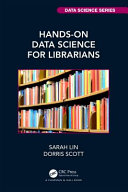

Most ebook files are in PDF format, so you can easily read them using various software such as Foxit Reader or directly on the Google Chrome browser.
Some ebook files are released by publishers in other formats such as .awz, .mobi, .epub, .fb2, etc. You may need to install specific software to read these formats on mobile/PC, such as Calibre.
Please read the tutorial at this link: https://ebookbell.com/faq
We offer FREE conversion to the popular formats you request; however, this may take some time. Therefore, right after payment, please email us, and we will try to provide the service as quickly as possible.
For some exceptional file formats or broken links (if any), please refrain from opening any disputes. Instead, email us first, and we will try to assist within a maximum of 6 hours.
EbookBell Team

4.7
76 reviewsLibrarians understand the need to store, use and analyze data related to their collection, patrons and institution, and there has been consistent interest over the last 10 years to improve data management, analysis, and visualization skills within the profession. However, librarians find it difficult to move from out-of-the-box proprietary software applications to the skills necessary to perform the range of data science actions in code. This book will focus on teaching R through relevant examples and skills that librarians need in their day-to-day lives that includes visualizations but goes much further to include web scraping, working with maps, creating interactive reports, machine learning, and others. While there’s a place for theory, ethics, and statistical methods, librarians need a tool to help them acquire enough facility with R to utilize data science skills in their daily work, no matter what type of library they work at (academic, public or special). By walking through each skill and its application to library work before walking the reader through each line of code, this book will support librarians who want to apply data science in their daily work. Hands-On Data Science for Librarians is intended for librarians (and other information professionals) in any library type (public, academic or special) as well as graduate students in library and information science (LIS).
Key Features: